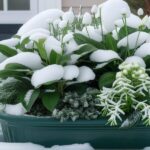6b Zone Container Gardening in the Fall and Winter: A Complete Guide
Discover the Secrets of Winter Container Gardening
Master Your Winter Garden in Zone 6b
As the cool autumn air arrives and winter gets closer, container gardeners in USDA Hardiness Zone 6b face some unique challenges. This guide will help you care for your container garden so your plants can stay healthy even in the cold.
Cold-Hardy Vegetables
Grow delicious and nutritious vegetables like kale and spinach that thrive in cooler temperatures.
Winter Beauty
Add visual interest to your garden with plants that shine in winter, such as ornamental grasses and winterberry.
Spring Preparation
Get a head start on your spring garden by planning and preparing during the winter months.
Understanding Zone 6b’s Winter Climate
Zone 6b has a winter climate where temperatures can change significantly. Some areas may have milder winters, while others might experience harsh frosts and extreme cold. Container plants are more vulnerable to these changes because their roots are not protected by the ground. Understanding these specific challenges is the first step to successful winter gardening.
Preparing Your Container Garden for Fall and Winter
Proper preparation is key to ensuring your container garden survives and thrives during the winter. Here are some important steps to take:
1. Choose Winter-Hardy Plants
To have a successful winter garden, choose plants that can handle Zone 6b’s cold weather. It’s best to pick plants rated for at least Zone 4 or 5 for extra protection. Good choices include Pansies, Ornamental Kale, Heuchera, Sedum, and Dwarf Conifers.
2. Insulate Your Containers
To protect your plants’ roots from freezing temperatures, wrap your containers with materials like burlap, bubble wrap, or old blankets. You can also place containers on wooden pallets to lift them off the cold ground.
3. Mulch Your Plants
Put a thick layer of mulch around the base of your plants to insulate the soil and protect the roots. Use organic mulch like straw, leaves, or wood chips to create a good barrier against the cold.
Winter Gardening Tips for Zone 6b
Winter gardening in Zone 6b can be rewarding if you use the right strategies. Here are some additional tips:
Plant Winter Vegetables
You can extend your growing season by planting cold-hardy vegetables like kale, spinach, and broccoli in containers.
Embrace Winter Interest
Add plants that look interesting in winter, such as ornamental grasses, winterberry, and witch hazel, to make your garden beautiful even in the cold.
Plan for Spring
Use the winter to plan your spring garden. Clean up beds, remove dead plants, and add fresh compost to get ready for the next growing season.
Protecting Your Container Garden from Winter’s Chill
Cold temperatures can be tough on container gardens, but there are several ways to protect your plants:
Group Containers Together
Putting your pots close together creates a small, warmer area that helps retain heat.
Wrap for Insulation
Wrap the outside of your pots with bubble wrap or burlap to protect the roots from the cold.
Use the Pot-in-Pot Method
Put your planted container inside a larger pot and fill the space between with insulating material like straw or leaves.

Leave a Reply